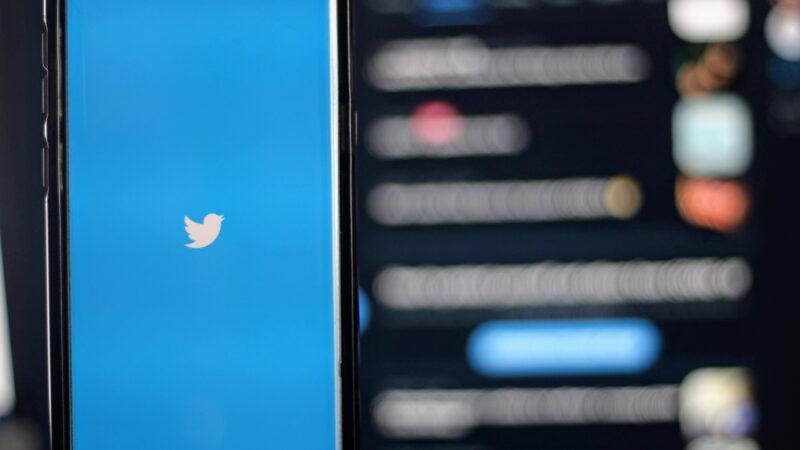Journalists Outraged That a Judge Would Dare Limit Biden's Censorship Powers
Unfortunately, there is reason to doubt that the judge's decision will meaningfully constrain the feds.

The federal government's vast and disconcerting campaign to curb politically disfavored speech on social media has finally encountered a setback. On Tuesday, District Court Judge Terry Doughty ruled against the Biden administration in a pivotal free speech case brought by Republican attorneys general on behalf of individuals punished by social media companies at the behest of federal officials.
"The underlying case alleges that coordination between government officials and social media companies including Meta (the owner of Facebook and Instagram) and Twitter routinely silenced opinions that challenged the mainstream narrative about the COVID-19 pandemic and other hot-button issues," notes Reason's Eric Boehm.
That case is well-supported by an ocean of evidence, including the various disclosures within the Twitter Files—a series by independent journalists—and the Facebook Files—my own investigation into federal pressure on social media companies. The hundreds of messages sent by employees of the FBI, Centers for Disease Control and Prevention (CDC), Department of Homeland Security (DHS), other agencies, and the White House to moderators at Twitter, Meta (the parent company of Facebook and Instagram), and Google make clear that the federal government pushed the platforms to suppress dissident viewpoints on a whole host of topics.
Doughty's ruling is a preliminary injunction that bars federal agencies from engaging in many—though not all—of these behaviors. The outcome has alarmed mainstream outlets like The Washington Post and The New York Times, whose reports included quotations from internet security "experts" fretting about the federal government's diminished ability to police speech online. Guests on CNN and MSNBC took an even more apocalyptic tone: CNN legal analyst Elie Honig assailed the "aggressive, far-reaching" ruling, while NBC News reporter Ryan Reilly described a world free of federal pressure on social media platforms as one that "we wouldn't want to live in." Reilly also fundamentally under-appreciated the scope of the pressure campaign, telling MSNBC viewers that "It's not as though the FBI has been going in & saying, 'Hey, take down this post.'"
MSNBC's @ryanjreilly argues the FBI isn't policing social media enough: "It's not as though the FBI has been going in & saying, 'Hey, take down this post.' … The FBI's not very good at monitoring social media. Look what happened on Jan 6th. There are all of these warning signs" pic.twitter.com/S2iIkbUbe0
— Tom Elliott (@tomselliott) July 5, 2023
Contrary to Reilly's claim, the FBI has done precisely that. For instance, the FBI frequently flagged joke tweets about the 2020 election and asked moderators at Twitter to take them down. The White House itself did the very same thing. As Doughty pointed out in his ruling, White House Digital Strategy Director Rob Flaherty personally appealed to Twitter to remove an account that parodied Biden's granddaughter. "Please remove this account immediately," wrote Flaherty. Forty-five minutes later, Twitter complied.
If Doughty's decision prevents the federal employees from engaging in such heavy-handed muzzling, it would be a welcome relief. Unfortunately, there is reason to doubt that the decision will meaningfully constrain the feds. That's because Doughty drew up a list of actions that are "NOT prohibited by this preliminary injunction," and this list could reasonably be read to permit the very sort of behavior—jawboning—that has produced the censorship.
Doughty's terms, for instance, allow the federal government to notify social media companies about threats to national security, criminal efforts to suppress voting, foreign attempts to influence elections, and communications that intend "to detect, prevent, or mitigate malicious cyber activity." It's worth recalling that prior to COVID-19, many of the communications between the feds and the platforms concerned precisely these subjects: purported foreign influence, malicious activity, etc.
When national intelligence officials cautioned social media companies about New York Post's Hunter Biden laptop story, for instance, they cited the threat of foreign election interference. Efforts to purge social media of so-called Russian bots—which was, in actuality, a crackdown on legitimate speech, expressed by Americans—were conducted under the auspices of malicious activity prevention.
Will Duffield, a policy analyst at the Cato Institute, is similarly concerned that Doughty's ruling might not make enough of a difference.
The top half of the injunction reads like a "complete and total shutdown of government communication with social media platforms until courts figure out what's going on, but the bottom half includes exceptions wide enough to include many of the most controversial government communications with platforms," he says.
Duffield would like to see federal legislation that mandates disclosure, forcing government actors to be transparent about their communications with social media companies so that they can be held accountable—even sued—if their conduct crosses the line into censorship.
"It's good to see courts taking jawboning seriously, but this preliminary injunction illustrates how difficult it is to draw clear lines that prohibit government bullying without blocking merely informative speech," he says.
In the meantime, the Biden administration has not said whether it will appeal Doughty's ruling.
"We do disagree with the decision, but the DOJ will come up with their own options," said White House Press Secretary Karine Jean-Pierre.


Show Comments (143)